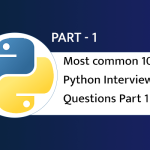Stack Overflow began in 2008 when Joel Spolsky and Jeff Atwood launched this Q&A platform for programmers. The idea was to create a space where developers could help each other out, share knowledge, and collectively level up their coding game.
The name “Stack Overflow” refers to a common programming error that occurs when a program’s call stack consumes all available memory. So, the platform was essentially a remedy for developers stuck in their own programming quagmires.
Over the years, Stack Overflow has grown into a massive community with millions of users seeking and providing solutions to an extensive range of programming problems. The site’s reputation system encourages users to contribute quality answers, and badges add a gamified element to participation.
It’s not just a platform for troubleshooting; it’s a knowledge hub where developers can learn, share insights, and even engage in discussions beyond code. Stack Overflow has become an indispensable resource in the developer’s toolkit.
Why use Stack Overflow?
Stack Overflow is like a developer’s Swiss Army knife for a few reasons. First and foremost, it’s a treasure trove of knowledge. If you encounter a programming problem, chances are someone else has faced it before, and Stack Overflow likely has a solution. It’s a fantastic resource for troubleshooting and learning.
The community aspect is another big draw. Developers from all over the world contribute their expertise, and the upvote/downvote system helps surface the most helpful answers. It’s like a collective brainpower pooling together to tackle coding challenges.
The reputation system also encourages users to provide accurate and well-explained solutions. This means you’re not just getting an answer; you’re getting an answer with context, which is incredibly valuable for understanding the why behind the solution.
Plus, it’s not just about problems. Stack Overflow is a place for discussions, sharing best practices, and even just geeking out about code. It’s a vibrant community that goes beyond simple question-and-answer interactions.
So, whether you’re a seasoned developer or just starting, Stack Overflow is a go-to resource for knowledge, community, and a bit of that satisfying “aha!” moment when you find the solution to your coding conundrum.
What is the benefit of Stack Overflow?
The benefits of Stack Overflow are manifold for developers:
- Knowledge Repository: It’s a vast repository of programming knowledge. If you have a coding problem, there’s a good chance someone else has had it too, and the solution might be waiting for you on Stack Overflow.
- Community Support: The community aspect is invaluable. You’re not alone in your coding journey. You can seek advice, share experiences, and learn from others who have faced similar challenges.
- Quality Answers: The platform encourages users to provide clear, well-explained answers. This means you’re not just getting a solution but understanding the reasoning behind it. It’s a great learning resource.
- Diverse Perspectives: Developers from around the globe contribute. This diversity of perspectives can lead to innovative solutions and a broader understanding of different programming paradigms and practices.
- Career Development: Actively participating on Stack Overflow can help build your professional profile. The reputation system and badges can showcase your expertise to potential employers.
- Documentation: Beyond solving specific issues, Stack Overflow often serves as a form of documentation. You can find examples, use cases, and discussions around various programming concepts and technologies.
- Time Efficiency: Instead of spending hours banging your head against the wall, you can post a question and, often, get a solution relatively quickly. It’s a time-efficient way of problem-solving.
- Gamification: The gamified aspects, like badges and reputation points, add a fun and motivating element to participation. It makes helping others and being an active part of the community rewarding.
In essence, Stack Overflow is not just a Q&A site; it’s a dynamic and collaborative platform that contributes significantly to the growth and learning of developers worldwide.
which topic cover in Stack Overflow
Stack Overflow covers a vast array of topics related to programming, software development, and technology. Some of the primary topics covered include:
- Programming Languages: Questions and discussions about various programming languages such as Python, Java, JavaScript, C++, and many more.
- Web Development: Topics related to web development, including HTML, CSS, front-end frameworks (e.g., React, Angular), back-end frameworks (e.g., Node.js, Django), and general web development practices.
- Database Management: Questions about database systems, SQL queries, database design, and related technologies (e.g., MySQL, PostgreSQL, MongoDB).
- Mobile Development: Discussions about mobile app development for platforms like iOS (Swift), Android (Java/Kotlin), and cross-platform solutions (e.g., React Native).
- Software Engineering Practices: Topics on software design patterns, best practices, version control (e.g., Git), testing methodologies, and code quality.
- DevOps: Discussions about DevOps practices, continuous integration, deployment strategies, and tools such as Docker and Kubernetes.
- Machine Learning and Data Science: Questions related to machine learning algorithms, data analysis, data visualization, and tools like TensorFlow and PyTorch.
- Operating Systems: Topics covering operating system concepts, system administration, and troubleshooting on platforms like Windows, Linux, and macOS.
- Networking: Discussions on network protocols, configurations, and troubleshooting network-related issues.
- General Programming Concepts: Questions about algorithms, data structures, problem-solving, and other fundamental programming concepts.
It’s important to note that while Stack Overflow covers a broad range of topics, the focus is on specific, answerable questions rather than open-ended discussions. Users are encouraged to ask clear and well-defined questions that can have specific answers.
Stack Overflow pros and cons
Certainly! Let’s break down the pros and cons of using Stack Overflow:
Pros:
- Vast Knowledge Base: Stack Overflow is a massive repository of programming knowledge. If you have a coding question or problem, there’s a good chance that someone has already asked it and received a solution.
- Community Support: The platform thrives on community contributions. Developers from around the world share their expertise, providing diverse perspectives and solutions.
- Quality Answers: The reputation system encourages users to provide clear, well-explained answers. This results in a collection of high-quality solutions that not only solve the immediate problem but also help users understand the underlying concepts.
- Time Efficiency: Instead of struggling with a problem for hours, you can post a question and often receive a solution relatively quickly. This can save a significant amount of time in troubleshooting.
- Gamification: The gamified elements, such as reputation points and badges, make participation engaging and rewarding. It encourages users to contribute and maintain the quality of the content.
- Career Development: Active participation on Stack Overflow can contribute to your professional profile. Employers often look at a developer’s Stack Overflow activity as a measure of their expertise and willingness to help others.
Cons:
- Possible Duplicate Questions: Due to the vast number of questions, there might be instances where similar questions have been asked before. This can lead to duplicate content, making it challenging to find the best answer.
- Subject to Changing Technologies: The fast-paced nature of technology means that answers, especially for cutting-edge technologies, can become outdated. It’s essential to verify information and consider the date of the answers.
- Quality Control: While the reputation system helps maintain quality, there can still be instances of incorrect or poorly explained answers. Users should critically evaluate solutions and not blindly trust them.
- Limited Context: Some questions may lack the necessary context, making it challenging to provide accurate and relevant answers. This is more of an issue with the nature of the questions than with the platform itself.
- Occasional Unfriendly Atmosphere: In rare cases, interactions on Stack Overflow can be less friendly, especially if questions are perceived as not meeting the community’s standards. It’s essential to approach the platform with a constructive mindset.
In summary, Stack Overflow is a powerful tool for developers, but like any platform, it has its challenges. Being aware of the potential cons and using the platform judiciously can enhance its benefits for users.











